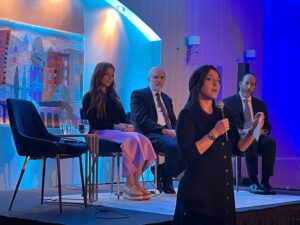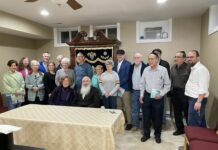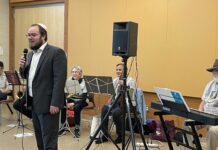The shidduch crisis — a phenomenon of Orthodox singles having trouble finding a spouse through traditional matchmaking — has long been a pervasive issue in the Orthodox community.

As standards for dating change and evolve, and as current events like the COVID-19 pandemic put a damper on the shidduch matchmaking process, more and more Orthodox Jews have remained single.
This crisis has prompted the Orthodox Union to conduct a research project about the challenges faced by Orthodox singles. The results were presented and discussed at a Ner Tamid Greenspring Valley Congregation event on Wednesday, Sept. 13.
“The most important finding from the research we did is that there’s actually two separate crises,” said Channah Cohen, co-author of “The Challenges of Singlehood Among American Jews” and the event’s moderator. “There’s the crisis of process, which is what you might think of when you think of the shidduch crisis. And there’s the crisis of experience, which is how single people feel and how they feel treated. The crisis of experience is what we’re here to discuss today.”
Cohen and four fellow researchers surveyed over 2,300 singles in the Orthodox community, finding that they often feel lonely and overlooked in their own communities. The report notes that they often felt infantilized and ignored due to the denomination’s strong focus on the family unit, and that they do not receive the help they need in finding a spouse.
“We heard this phrase again and again [from participants]: ‘I want to feel like a legitimate human being,’” Cohen said.
One of the discussion’s participants — social worker and singles advocate Tzipora Grodko — has personal experience with the subject due to her status as a single woman in the community.
“As I aged, I found that the greatest gift of all — time — was something I started to feel ashamed of,” Grodko said. “It was terrifying to turn 29 in the Orthodox community because of the shame and negative energy I felt because I was still single.”
She noted that she would often find herself playing with her friends’ children rather than engaging with her friends directly, due to a sense of shame she often felt about her single status and the ostracization she experienced because of it. Her friends’ understanding helped her to come to terms with it, but not everyone has the luxury of that support.
Another discussion participant, Rabbi Shmuel Silber of Baltimore’s Suburban Orthodox Congregation, said he became especially aware of this crisis of experience at a conference of Orthodox single mothers.
“I came out of that with an incredible epiphany,” he recalled. “Ours is a very family-centric shul. For families, it’s fantastic. But I sat in that conference room with a pit in my stomach, wondering if we had forgotten about certain populations within our shul. As much as it pains me to say, the answer is yes.”
The event was attended by Ner Tamid congregants and other members of the local Orthodox community, both married and unmarried. The Baltimore synagogue was one of three locations that hosted this discussion — Sept. 11 saw a version at Boca Raton Synagogue in Florida, and a virtual livestream from Orthodox Union’s headquarters took place on Sept. 18.
Ner Tamid was chosen because its rabbi, Rabbi Yisrael Motzen, works at the OU as an assistant to its executive vice presidents. “It was a natural choice,” he said.
One potential way to treat this crisis of experience, suggested by OU Executive Vice President Rabbi Moshe Hauer, is to further extend the support networks offered by Orthodox shuls to single members. He noted that while many married Orthodox Jews want to help their single brethren, there is a gap in communication between the two that leads to the latter feeling pitied and ostracized.
“When people come [to shul] on their own, we haven’t quite figured out what to do,” he explained. “We have to figure out how we can continue to celebrate the value of family, but at the same time embrace and value the many people who don’t have that as a nuclear support system. That’s what the Torah has asked us to do, over and over again.”
Motzen said in an interview with the JT that involving single members of the community in Orthodox events is important, and it can be more meaningful to them than married people might realize.
“Being that we are such a family-centric community, especially this time of year, being extra thoughtful about who we invite to our holiday meals is so important,” he said. “It can make all the difference between a depressing and lonely holiday to a festive one.”







